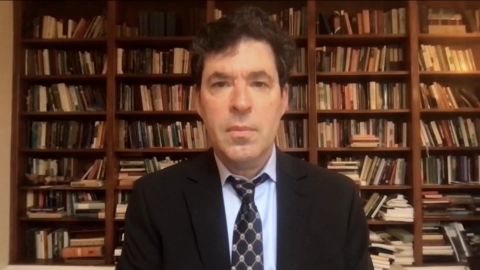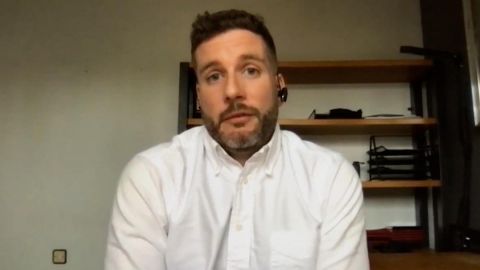CHRISTIANE AMANPOUR: So, the ongoing war is already becoming part of Ukraine’s actual military history. The remains of Russian equipment are being displayed at a museum of Kyiv for all to see. Of course, history itself has been distorted and deployed as a weapon in this conflict. Russia’s claim to be denazifying Ukraine took an uglier turn when the country’s foreign minister, Sergey Lavrov, said that it didn’t matter that Ukrainian President Zelenskyy is Jewish because Hitler was part Jewish. It is a comment that unsurprisingly was widely condemned. In conversation with Hari Sreenivasan, the Yale professor of Jewish history, Eliyahu Stern, explains the danger of this kind of language and the motivation behind it.
(BEGIN VIDEOTAPE)
HARI SREENIVASAN, CORRESPONDENT: Christiane, thanks. Professor Eliyahu Stern, thanks so much for joining us. I want to go back to last week where there were comments from Foreign Minister Lavrov. And I should note to the audience that since then, Vladimir Putin has apologized to the prime minister of Israel, and the Israeli prime minister has accepted it. But I think these comments are worth some unpacking. So, let me just — to refresh our audience here, here is what he said. As to Zelenskyy’s argument of what kind of Nazification can we have if I’m Jewish, if I remember correctly, and I may be wrong, Hitler also had Jewish blood? This is Foreign Minister Lavrov saying this. It doesn’t mean anything at all. We have, for a long time, listened to the wise Jewish people who say that the most rabid anti-Semites tend to be Jews. There is no family without a monster. There’s kind of two parts to that. And I kind of want to get you and your thoughts here on both of those parts and why they were so significant.
ELIYAHU STERN, PROFESSOR OF MODERN JEWISH HISTORY, YALE UNIVERSITY: Thank you, Hari. It’s a pleasure to be speaking with you. Foreign Minister Lavrov’s comments are deeply disturbing. First, they run rug shot over the history of the holocaust. They turn victims into perpetrators, perpetrators into victims. They divide Jews against Jews. And then, to add insult to injury, claim that the murder of 6 million Jews was perpetrated at the hands of Jews themselves, no less than Adolf Hitler. Now, as surprising as these shocking these comments are, they are actually not surprising. In fact, they never — precisely the arguments made a few months earlier by Vladimir Putin to justify his campaign in Ukraine. What it did Mr. Putin tell us? Mr. Putin first denied that Ukraine had national history. Then he identified Ukraine as an aggressor. Then he divided Ukrainians against each other based on language and ethnicity. And finally, said that whatever ill might befall the Ukrainian people, they only had themselves to blame.
SREENIVASAN: I’m trying to wrap my head around, why was this the red line that was crossed? Because there’s been a lot of critique of Israel saying that you are not sticking up for Ukrainians nearly enough, you are not condemning Russia as strongly as you should be. You are still not slapping sanctions on the oligarchs. Why were the comments from Foreign Minister Lavrov something that immediately drew rebuke from Israeli leadership?
STERN: Yes. I was pleasantly surprised. I was heartened to see Israel respond the way it did. And, at least to me, and I think to some others, it wasn’t clear that Israel would come out as strong as it did. As you mentioned, Hari, up until this point, Israel has played a kind, of middleman role in the war between Ukraine and Russia, for a host of reasons, not least because Russia is right now based in Syria, supporting the Assad regime. While Israel continues to conduct covert military operations in Syria against Hezbollah with Russia allowing them entry into its — into Syrian airspace or allowing its troops to be brought into — to conduct those operations. So, in terms of Israel’s strategic interests, it has had to walk at this point — it has walked very fine line and has been playing a middle role. After the Charlottesville rally in which President Donald Trump said there were fine people on both sides of the divide at that rally, thereby giving a pass to the white supremacists that were screaming at that Charlottesville rally, Jews will not replace it. It took Prime Minister Netanyahu only three days before he offered only the most tepid critics of the rally. So here, in this case, you know, kudos to Naftali Bennett and to Yair Lapid, they should be credited. They stepped up and took the side to defend Jews worldwide, realizing that a red line here was being crossed irrespective of what Israel’s short-term interests were. This was a direct threat to Jews across the world, and they should be commended for taking those steps.
SREENIVASAN: I’m wondering when Foreign Minister Lavrov makes comments like this or something like this comes from a different arm of the Russian government, is it resonating in any way with Russians at home and how they perceive the Jewish people?
STERN: So, what Putin is doing, yes — or Lavrov, more precisely at that moment, is giving a warning call to Jews in Russia and a warning to Israel, that it should be careful and it should tread carefully and must continue to support Russia or pay a serious price. I mean, when we look at Putin today, what — in relation to the Jews, what’s most confounding, I think too many who historically look at anti- Semitism is, he doesn’t seem, at least on the surface, to express any of the typical markers that we would normally associate with anti-Semites. And so, it becomes very difficult, at times, to be able to understand, what exactly is his strategy, vis-a-vis various minority groups for religious groups. And, while he might not reflect typical forms of anti-Semitism, what we see, in effect, is him dividing minority groups against themselves, privileging a small subsection of them, and then claiming that the rest of them are no longer part of those minority groups.
SREENIVASAN: This makes me ask the question whether our definition of anti-Semitism is changing in front of us. And what does that mean?
STERN: Yes. I think you touched on really the most important, significant development that we are seeing here with Mr. Lavrov’s comments. Because, in many ways, they are indicative of a far broader transformation of what constitutes anti-Semitism, specifically among right-wing parties worldwide today. In the public eye, most people would identify anti-Semitism. And, of course, it’s historically taken many different shapes and faces. But most people would adopt the definition that Hitler adopted. Anybody who is biologically Jewish, who is discriminated against, anyone who has any kind of Jewish biological heritage, who is not treated fairly and equally because of that biological relation, that is deemed anti-Semitism. Now, what’s happened since the 1970s, is that right-wing parties around the world have shifted way from a biological definition of minority groups, and specifically of Jews, and have adopted a cultural and ideological, and identitarian (ph) definition of their relationship to those groups. So, let me explain. Instead of seeing all Jews as being tainted or as being evil or as being worthy of discrimination, right-wing groups around the world are prepared to partner with and are prepared increasingly to ally with those Jews who embrace certain traditionalist values and respect authoritarian regimes. So, for example, Vladimir Putin has by his side Rabbi Berel Lazar. His self-appointed chief rabbi. This also has taken place in Hungary in which you Viktor Orban having his own set of rabbinic supporters, those primarily who come from the orthodox sector of the Jewish world, but by no means all of that sector. And, what they do then take that group and claim that they represent the true identity of the group, all the while Jews who are secularists, who are progressive, who are liberals, are simply deemed not Jewish at all, or un-Jewish.
SREENIVASAN: I wonder how this translates into the rise of anti-Semitism here in the United States. And then, according to the Anti-Defamation League, we’re at somewhere around seven different anti-Semitic incidents every day in this country.
STERN: I think what’s happening in the United States is twofold. What is taking place with anti-Semitism is because there no longer is a working or set definition of what constitutes a true Jewish identity. It makes it also increasingly difficult to identify what’s actually is anti-Semitism. Now, in the case of the United States, we see two different kinds of anti- Semitism. The lion share of anti-Semitism, what the ADL actually says in its report, the lion share of anti-Semitism comes from various individuals associated with right-wing nationalist, white supremacists and neo-Nazi groups. Some has — have also merged during times in which Israel finds itself at various wars with the Palestinian people. And so, you will also see different kinds of anti-Semitic tactics as forms of anti-Israeli expressions. But most importantly, I think the reason we are seeing this spike right now is a certain destabilization of democratic institutions in the United States. It’s specifically happening across the world, the western world, in which we see western democratic institutions being undermined. That undermining is itself giving rise to all various forms of discrimination, racism and anti-Semitism from across the board.
SREENIVASAN: I was just looking at some these statistics globally. In the U.K., in Australia, it is up about 35 percent. I’m talking about anti- Semitism. In France, it’s up almost 75 percent in 2021 from the year before that. In Germany, it is up 49 percent since 2019. And the United States it is, unfortunately, rising, not slowing down.
STERN: Yes. I think, first of all, one of the things that we haven’t touched on is the extent to which the Jewish community is itself divided over these issues, deeply, deeply divided of these issues. You know, anti- Semitism has two words in it, Hari. One is the anti, the other is semi. And if you can’t agree on who or what is the semi, then how on earth are you going to be able to agree on who or what is anti-Semitic? So, what’s happened is that right-wing groups have tapped into that edition, have sown greater seeds of discords and have both tried to redefine what the Jew and who really speaks for Jews. And at the same time, been allowed then to use that as cover to be able to allow certain groups to perpetrate anti-Semitic attacks and activities. You know, during the Trump administration, we saw the — his ambassador to Israel, David Friedman, who was, if you recall, forced to walk back comments at his Senate hearing for his nomination in which he stated that liberal Jews who are critical of Israel were in fact Kapos. Kapos being the term used to describe those Jews that assisted Nazis in the murder of 6 million Jews. Now, to his credit, Mr. Friedman walk back those comments. But what we see is a ratcheting up of discourse of demonizing liberal, secular and progressive Jews around the world both by Jews themselves and by anti- Semites. And the two, of course, cannot be equated. But what the State of Israel did and why it’s so significant what Bennett did this past week is he said, enough was enough.
SREENIVASAN: What do we know about patterns of how Jewish people are treated in a society, and what happens to other minorities in that society?
STERN: So, you know, I think, historically, the way Jews would like to see anti-Semitism is they have traditionally seen themselves or described themselves as canaries in the coal mine, right? And so, if Jews were being discriminated against, it pointed to larger problems with a democracy. It pointed to larger problems with freedoms of press. It pointed to larger problems with the way in which minorities would be treated. I think today, we need to invert that knowledge. In fact, I think the best way we’re going to be able to address anti-Semitism today is by strengthening democracies. The way to go about addressing anti-Semitism is not by simply protecting Jews. What we’re seeing in the United States staying across Europe is a shaking of the very foundations of democratic institutions, a respect for minorities across the board, respect for freedom of the press, demonization of immigrant groups. These kinds of activities ultimately are the greatest threat to Jews. Jews, Hari, have prospered, have flourished and thrived in democracies. When democracies are undermined, ultimately — Jews might not be the first, but they ultimately will be hurt. It’s in Jew’s best interest, it’s in Israel’s best interest to be supporting democracies worldwide, fighting against fascism and authoritarian regimes.
SREENIVASAN: Broadcasting this conversation on May 9th, this is Russian Victory Day. This is the day they beat the Nazis. What do you think the timing? Is this a coincidence? You know, why now would Lavrov say what he said and start this?
STERN: I think Mr. Lavrov and Mr. Putin are increasingly going to be charged and increasingly going to be seen as committing various egregious acts of human rights violations, as well as discrimination of minority groups and perhaps some people have said, although, it is still debated, to some degree, even genocide. I think they are very cautious and I think that they are very concerned of a court of international opinion is regarding their activities in Ukraine. What they are attempting to do is to shield themselves and their soldiers long-term from being charged with those kinds of human rights violations. And what they think speciously is if they could claim the mantle of the defenders of the Jews, the defenders of the canaries in the coal mine, that they, in some ways, we’ll be able to whitewash their activities. Hari, for Putin and Lavrov, the statement is, what me, committing a grave atrocity or human rights violation? I am a great protector of the most weakest and vulnerable people in the world, the Jewish people. And what Naftali Bennett did, and what the State of Israel did this past week was to say, no, you’re not going to get away with the use of Jews, abusing Jews for those kinds of activities.
SREENIVASAN: Eliyahu Stern, professor of modern Jewish history at Yale University, thanks so much for joining us.
STERN: Thank you.



